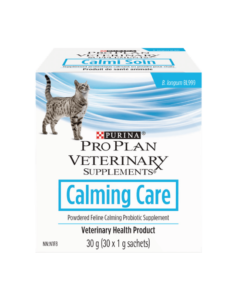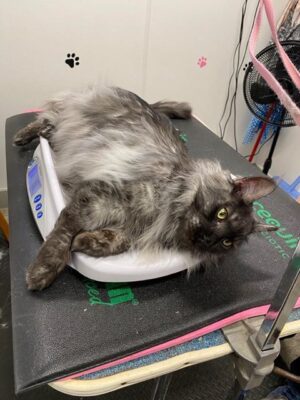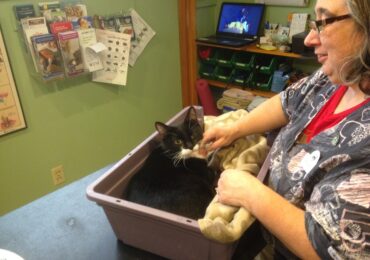Cats, disease, nutrition, and behavior
The connection of physical health with behavioral health has often been considered by a veterinarian in practice. It makes sense when an animal is in pain, they will act aggressively when touched or approached or perhaps act “off” – less social, more anxious, or aggressive when there are biochemical changes from diabetes, viral infection, or nutritional deficiencies. One recent discovery showing the brain – nutrition – behavior connection is thiamine deficiency. Early signs of thiamine deficiency are often avoiding jumping up on perches, increased aggression, or agitation. Feline diets have been improved, so thiamine deficiency is not common in cats fed commercial food. Thiamine deficiency is considered when neurological or behavioral signs are present in a cat-fed homemade diet. The veterinarian recognizes the brain – nutrition-behavior connection and has ways to test for this and treat this deficiency.
The feline gut
All mammals have certain bacteria that live in the intestinal tract to help with digestion, stimulate the absorption of nutrients and build strength to the immune system (1). There is a blend of microorganisms, supported by fiber and other nutrients to provide a balance of health. Overgrowth and lack of certain organisms can cause inflammation, interfere with immune system response and nutrient absorption. Maintaining a balance of the right microorganisms, along with the diet that supports good gut health is the basis for overall health.
The intestines are an important organ for absorbing the right nutrients and blocking the toxins, large undigestible products, allergens, and bacteria out of the body. When the intestinal lining is damaged from parasites, viral infections, poor nutrition, trauma, or genetic disorders the gut will leak the “bad stuff” out into the body. This is called “leaky gut syndrome” (2). It is not unusual for kittens to be infected with roundworms, hookworms, giardia, coccidia all of which will cause loose stools, indictive of the intestinal inflammation and damage they cause. Immediate treatment for these parasites, feeding a balanced diet, and preventing reinfection may be all that is needed to reinstate a healthy gut. Viral infections can chronic in their damage. Feline herpes virus is one of the common virus’ kittens have been exposed to. It can cause loose stools, runny noses, red eyes, and weight loss. Vaccination and early treatment can help kittens to heal and possibly prevent long-term problems, yet many cats have chronic bowel problems, vomiting, lack of appetite, red eyes, or sinus flare-ups related to latent herpes virus infections. Owned cats can have flare-ups of intestinal signs, inflamed eyes, or sneezing during times of stress as can a cat in a shelter. The stress-disease outbreak cycle can cause significant welfare and housing problems in our cats awaiting forever homes in our shelter.
Bacteria to the rescue!
Mike Lappin DVM, is a leading expert and researcher in feline medicine, leading research at Colorado State University College of Veterinary Medicine (3). His focus on the feline immune response to vaccinations has included studies using probiotics to measure clinical disease management. I heard Dr. Lappin speak at a veterinary conference in 2009, presenting the study managing Feline Herpes Virus using probiotics, Fortiflora specifically. He was very entertaining, describing how his first boss in the 1970’s would make a “fecal dog food shake” for the parvo infected dogs as treatment, and how crazy that sounded. We were all laughing with him as he described now that is what he does all the time now – give sick pets gut bacteria and measure response. What impacted me that day, was how a simple improvement in the gut would improve the whole body’s health. In the 2009 study, the rates of sneezing, runny eyes and low appetite were decreased significantly in the cats on the probiotic.
Recently, Dr. Lappin and others studied the probiotic in Calming Care with cats infected with the latent herpes virus. Bifidobacterium Longum is the bacteria in Calming Care by Purina. Calming Care has been proven to decrease stress signs in dogs and was now tested in cats to see the effect on stress and herpes symptom outbreak. You can read the abstract of the study published in July 2021 here. I also presented information about this study on my Facebook live stream which you can watch here
I have not read the entire study, yet from the abstract, I am very encouraged to know this product has dual benefits for feline health and welfare. The evidence of cortisol levels decreasing with the use of the probiotic is especially important, as many feline organ systems are impacted by cortisol increase. Feline interstitial cystitis, cardiomyopathy decline, and diabetes are three disease processes impacted by stress in our cats at home or in shelters. The behavior measurements of coming up to the front of the cage and accepting approach are significant, especially in a caged cat. Less sneezing and watery eyes are a big welfare improvement. I know many clients who have FHV positive cats and struggle with eye ointments, oral antibiotics, lysine supplements, and antiviral medication administration, not to mention the cost of some of these products. A simple, healthy additive to daily feeding can help decrease stress, decrease clinical signs from a latent common viral infection and improve health and welfare. Fantastic !!!!!!
Cats love probiotic powder

Giving cats medication is often difficult. Cats are more sensitive to the taste, texture, and mouthfeel of food. When medications or supplements are added to food, often a cat will refuse to eat it picking up on the taste or texture change. Many manufacturers work hard at creating products that a cat will not notice or may actually like. Few can find a way to appeal to a cat’s tastes. The Fortiflora probiotic is one many cats will eat well. I have even seen cats knock it off the counter, and bite into the packets to eat the powder. I know the Calming Care probiotic is very tasty for dogs. I think the cats will also like the Calming Care product as well. Now the client does not need to hold the cat or squirt anything in the mouth. This eliminates a lot of owner-directed anxiety from medication, again decreasing stress. I have recently prescribed Calming Care for my feline cases. It will be interesting to see the impact of this product on both behavior and health.
If your cat has had chronic bowel, upper respiratory signs that come and go, or is hiding, talk to your veterinarian about trying the calming care probiotic. Many cats are improving within 2 weeks after starting the supplement. Be sure to also add more perches, increase playtime, and feed your cat in small dishes set up through the home to engage in hunting skills. These steps will help decrease stress for your cat and improve health.
Feline behavior and health telehealth consults
Feline behavior and health is a passion of mine. I know it can be frustrating to try to figure out is it behavior, a health issue, or both? And then, how do you manage both? I provide video chat telehealth consults to any cat pet parent and collaborate with your veterinarian for the medical plan. If you would like to schedule a consult, please go to my website page and fill out the feline consult form here. I schedule consults in the day or evenings and Saturdays. You will receive the recording of the consult, a report, my consult with your veterinarian, and 3 months of online support with your consult. It can be difficult to put all the pieces of behavior, medicine, welfare, and not stress your cat out during care. That is what I do – bring it all together in a team approach for you, your veterinarian, and your cat.
Thank you
Sally J Foote DVM, CABC-IAABC, LSHC-S


- Wortinger, A. Prebiotics and Pr0biotics for dogs and cats https://todaysveterinarynurse.com/articles/prebiotics-and-probiotics-for-dogs-and-cats accessed 8/10/2021.
- Barnette, C. Leaky gut syndrome in Cats https://vcahospitals.com/know-your-pet/leaky-gut-syndrome-in-cats accessed 8/10/2021
- Lappin, M biography Colorado State University http://www.csuvth.colostate.edu/directorysearch/search/groupdetail/vth/companionanimalstudies accessed 8/10/2021
- Lappin, M. Pilot Study to Evaluate the oral supplementation of E. Faceium on cats with latent herpes virus infection. efficacy of https://pubmed.ncbi.nlm.nih.gov/19201238/ accessed 8/10/2021

